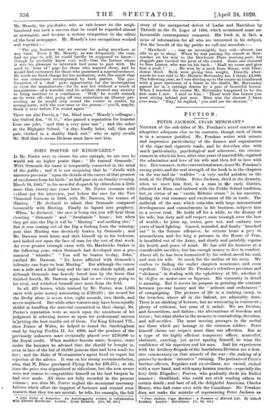JOHN PORTER OF KINGSCLERE.*
IF Mr. Porter were to choose his own epitaph, we are sure he would ask no higher praise than : He trained Ormonde." With Ormonde his name is inseparably connected in the mind of the public ; and it is not surprising that he " dwells with amorous precision " upon the details of the career of that greatest of racehorses from his birth " at half-past six on Sunday evening, March 18, 1883," to his merciful despatch by chloroform a little more than twenty-one years later. Mr. Porter recounts with evident joy his interview, just before the race for the Two Thousand Guineas in 1886, with Mr. Dawson, the trainer of Minting. " He declined to admit that Ormonde compared favourably with Minting. Finally he lapsed into prophecy.
When,' he declared, ' the race is being run you will hear them shouting " Ormonde " and " Sarabande " home ; but when they get into the Dip it will be " Minting " and nothing else.' " But it was coming out of the Dip a furlong from the winning- post that Minting was decisively beaten by Ormonde ; and Mr. Dawson went home and shut himself up in his bedroom, and looked not upon the face of man for the rest of that week. An even greater triumph came with the Hardwicke Stakes in the following year, when Ormonde had developed into a pro- nounced " whistler." " You will be beaten to-day, John," exulted Mr. Dawson. " No horse afflicted with Ormonde's infirmity can hope to beat Minting." But although the course was a mile and a half long and the last two-thirds uphill, and although Ormonde was heavily bored into by the horse that finished fourth, Mr. Dawson again had to see victory going to his rival, and withdrew himself once more from the field.
In all, 425 horses, while trained by Mr. Porter, won 1,063 races with prize money amounting to £720,021 ; his record for the Derby alone is seven wins, eight seconds, two thirds, and seven unplaced. But while other trainers may have been equally skilful in handling the material committed to their charge, Mr. Porter's reputation rests as much upon the soundness of his judgment in selecting horses as upon his professional success in"getting the best results out of them. For King Edward VII., then Prince of Wales, he helped to found the Sandringham stud by buying Perdita II. for £900, and the produce of the previously unknown mare eventually placed over £250,000 to the Royal credit. When another famous mare, Sceptre, came under the hammer he advised that she should be bought in, even in face of the bid of 10,000 guineas that had been made for her ; and the Duke of Westminster's agent lived to regret his rejection of the advice. It was on his strong recommendation, also, that M. Blanc purchased Flying Fox for £39,375 ; at the time the price was stigmatized as ridiculous, but the new owner soon saw reason to congratulate himself on the best bargain he had ever made. All these are fully recorded in the present volume ; nor does Mr. Porter neglect the occasional necessary failures which offset the happiest of fortunes and remind even trainers that they too are mortal : he tells, for example, the full • John Porter of Kingsclesc. An AutobioftraPhY written In collaboration with Edward Newhouse. Leaden; Grant Richards. 1315. Oct. net.) story of the unexpected defeat of Ladas and Matchbox by Throstle in the St. Leger of 1894, which occasioned some un- favourable contemporary comment. His book is, in fact, a mine of information for all who are interested in his subject. For the benefit of the lay public we cull one anecdote :- " Hawfmch . . , was an incorrigibly lazy colt—almost too idle to go to sleep. When he was passing the stands at New- market on his way to the Dewhurst Plate starting-post, his sluggish gait excited the jeers of the crowd. Some one shouted to Sam Loates, who was on his back : Shall we come and give him a push ? ' . . . He won by a neck from Nixing, with Dieu- donne third. Both were giving him weight. Directly after. wards he was sold to Mr. Horatio Bottomley for, I think, £3,000. The following year, as I was driving up to the course at Goodwood with a poor specimen of a horse in the shafts, Mr. Bottomley passed me in a carriage drawn by a pair of beautiful horses. When I reached the course Mr. Bottomley happened to be the first man I saw. I said to him : Those were fine horses you were sitting behind just now. Mine was the slowest I have ever seen.' Nay,' he replied, you sold me the slowest.' "


































 Previous page
Previous page